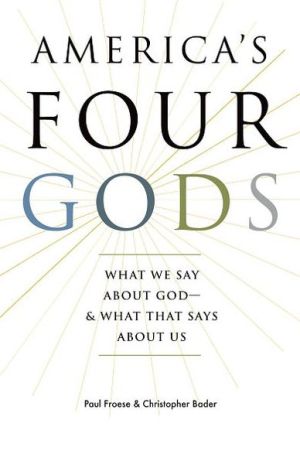

 |

|

The average rating for America's Four Gods: What We Say about God--and What That Says about Us based on 2 reviews is 3.5 stars.
Review # 1 was written on 2010-12-25 00:00:00 William Chou William ChouAmerica's Four Gods is a fascinating and unique look at how Americans perceive God. When the right questions are asked, we find that people claiming the same religion, and even worshipping within the same church, believe in different versions of the same God. These beliefs color much of each person's views on life, from personal morals to politics. While this book is well researched, documented and detailed, it is also easy to read and entertaining. A great read for anyone interested in religion and/or human behavior. |
Review # 2 was written on 2018-09-03 00:00:00 Felipe Carvalho Felipe CarvalhoAmerica's Four Gods seeks to provide a snapshot of how the American public perceives of God in regard to His characteristics and engagement with the country and wider world. This is accomplished with surveys and interviews with the end goal of determining how the perceived notions of God contribute to and interrelate with perceptions of moral and political world views. The American public, of course, has as many views of God as there are people as the results are actually going to be on a continua with no two survey participants feeling exactly the same way about any given characteristic or quality of God. For ease of statistics, the authors decided to divide these beliefs into four separate categories, acknowledging the variations in opinion within any given category. These four categories include the Authoritative God who is judgmental and engaged with the world, the Benevolent God who is nonjudgmental but still engaged with the world, the Critical God who is judgmental but not engaged with the cosmos, and the Distant God who is both nonjudgmental and not engaged with the world. I found this approach to be helpful in generalizing trends and how beliefs inform the way people expect the Lord to operate in the world and how the individual might support or argue for moral and/or political beliefs to which they adhere. As might be expected, the tendency of the categories is from more conservative to more liberal, and these tendencies display themselves in the associated statistics. Negatively, I think the book is too simplistic to be of any lasting value, and I am not persuaded it is really worthwhile for the present. As is often the case with sociological texts at the introductory level, the information presented seems to be common sense, and, aside from specific terminology, I feel that I was already aware of everything the authors presented. Further, the authors are too liberal in their assessment for belief in God to skew the figures so that it appears that Christians represent a larger percentage of the population than is accurate. A related issue is their apparent belief in the two branches of Christianity, thereby tremendously skewing the statistics in an invalid manner. Moreover, the copy I read was an e-book, and the graphs that make up the spine of the text were all partially missing, so that I had to infer what the charts were. Overall, I do not recommend this book as it is too sophomoric nd inaccurate for all but readers particularly interested in a sociological introduction to what they know before beginning the text. I sincerely think the book deserves 1.5 stars, but, since half stars are not allowed, I have rounded up to two. |
CAN'T FIND WHAT YOU'RE LOOKING FOR? CLICK HERE!!!